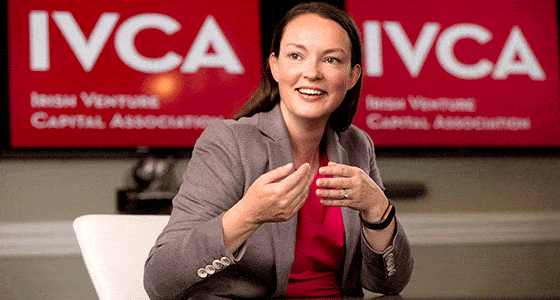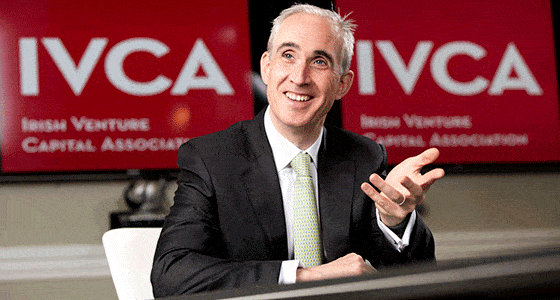Pictured: Neil McGowan, chairman, Irish Venture Capital Association (IVCA)
A new study from Dublin City University (DCU) finds that venture capital backed firms helped to create up to 100,000 jobs over last 15 years.
Venture capital and private equity-backed firms have helped to create up to 100,000 high level jobs since 2003, according to an economic impact study launched in Dublin today, January 28, by DCU Business School.
According to the report, venture capital portfolio companies have created 5,000 jobs since 2016, mostly graduate. Over the last fifteen years – up to 2018 inclusive – the DCU research finds that portfolio companies have created 25,046 high calibre jobs, of which 7,098 are represented in the current portfolio, and 17,948 were in exits since 2003.
“Based on estimates that these companies support up to three additional downstream jobs means that equity funded companies helped to create up to a further 75,000 jobs or 100,000 in total,” said Dr. Eric Clinton, associate professor in entrepreneurship at DCU Business School and author of the report.

Dr. Eric Clinton, DCU Business School
“This may be a conservative estimate of job creation as our study does not include the growth in employment in equity backed firms since they exited the portfolio due to acquisition or IPO.”
Neil McGowan, Chairman of the Irish Venture Capital Association (IVCA) said: “Irish venture capital and private equity firms have invested €5 billion in Irish SMEs since 2003 and, through syndication, have attracted in a further €3 billion in funding from international firms.”
He also said that, in 2017, activity levels reached an all-time high with 291 funding rounds raising €994 million. During the three year period 2016 to 2018, 748 funding rounds have raised €2.6 billion.
“Compared to the previous study period (2012-2015), this is an increase of over 60% in the number of fundraising rounds and a 115% increase in the amount of capital raised by innovative SMEs.”
Thanks to social media they have an outward looking perspective and are influenced by 20 plus year old global role models who are carving out successful new businesses, many internet related.
Mr. McGowan added that there could be up to €1 billion available for investment up to 2024: “The Government has been proactive, and through Enterprise Ireland, committed up to €175 million as a cornerstone investor to venture capital funds under the Seed & Venture Capital Scheme 2019-2024.
“ISIF (Ireland Strategic Investment Fund) is also a critical funding partner of IVCA members. Based on historic activity, it is anticipated that the venture capital and private equity industry will leverage this commitment by a multiple of four to five times.”
Today’s Generation
Dr. Clinton, who lectures 300 students in entrepreneurship in DCU, said, “An encouraging entrepreneurial pipeline is developing in Ireland as today’s … generation demonstrates an increased appetite to start their own businesses. Thanks to social media they have an outward looking perspective, and are influenced by 20 plus year old global role models who are carving out successful new businesses, many internet related.
“At a time when Ireland remains overly dependent on Foreign Direct Investment, it is vital that the Government creates the environment to harness this appetite for entrepreneurship. For example, current capital gains tax rates are a disincentive to younger members taking over a family firm.”
“We found that high tech companies accounted for 90% of funds raised between 2016 and 2018 compared to the European average of 22%. This is the highest technology weighting in Europe and more equivalent to Silicon Valley.”
The DCU report also warns that “incentives offered to entrepreneurs in other European countries are overtaking those offered in Ireland”.
Dr. Clinton said that while many students were still attracted to employment in multinational marquee names like Google and Facebook, recent years have seen much greater interest in starting their own businesses.
He referred to a 2016 study which found that five years after graduation, more Irish students (27.4%) were interested in starting their own business than working with a large company (18.6%).
“Another positive sea change is that women are becoming just as interested in starting new businesses as their male counterparts. This entrepreneurial appetite amongst men and women is being driven by work life balance, increasing awareness of the importance of mental health and the social media influence of global young role models.”
Sarah-Jane Larkin, Director General, IVCA, said that one of the encouraging findings from the latest study was that venture capital investment in a firm stimulates the creation of between two and twelve additional spin-out companies.
“This compares favourably with FDI enterprises and has created a new generation of serial entrepreneurs who are now dominant in early stage sectors. For example, Parthus, Iona and SmartForce alone have spun out 146 companies.”

Sarah-Jane Larkin, Director General, IVCA
Dr. Clinton of DCU added: “From a public policy perspective, it is particularly noteworthy that venture capital and private equity backed companies grow faster, create more jobs, exports and invest more in R&D than other SMEs. For example, employment numbers in these firms have increased by an average of 27% per annum since 2016. This compares to an overall increase in employment in the economy of 3.3% per annum since 2016.”
Expenditure on R&D by IVCA portfolio companies represents 35% of all SME share of total spend on BERD (Business Expenditure on Research and Development) in the years 2016-2018.
IVCA portfolio companies increased exports by 35% in 2018 and by 16% per annum since 2016. This compares to an increase of 15% in total Irish exports in 2018 and to an annual average increase of 7% since 2016.
Dr. Clinton concluded: “VC backed firms are important in helping to build an indigenous knowledge economy. We found that high tech companies accounted for 90% of funds raised between 2016 and 2018 compared to the European average of 22%. This is the highest technology weighting in Europe and more equivalent to Silicon Valley.”
However, the study recommends that “new tax incentives should be considered to encourage private capital away from passive assets to fund the future of Irish industry and the productive assets that will power the Irish economy over the next fifteen years”.
The report can be downloaded at www.ivca.ie.





